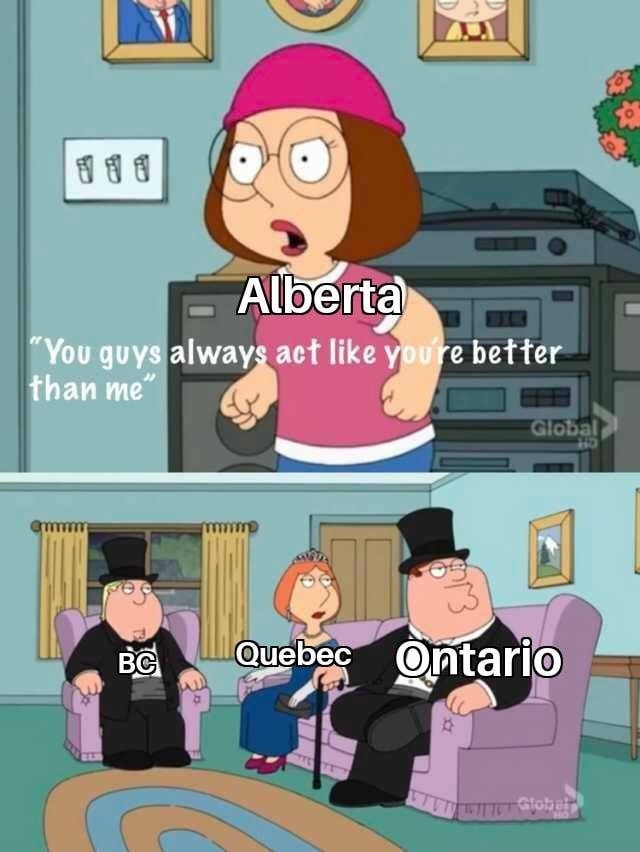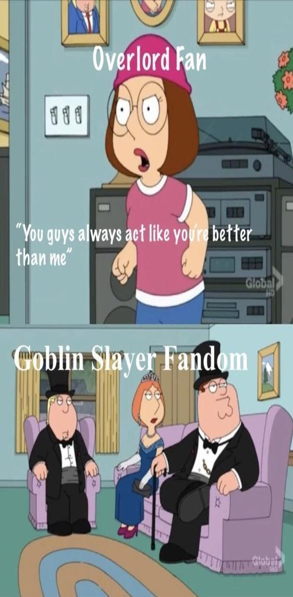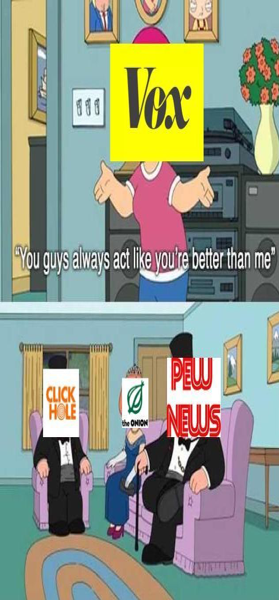By Sarah Knappers

About and Origin
The template of this two-panel meme is featured on the Know Your Meme website as the “You Guys Always Act Like You’re Better Than Me” meme. The stills are from an episode of the popular TV show Family Guy, which aired on October 2nd, 2011. Specifically, “in the episode, character Meg Griffin, voiced by Mila Kunis, confronts her family about them constantly acting superior to her” (Know Your Meme, n.d.). Know Your Meme notes the template originates from Reddit, where it was first posted by Reddit user “KingWildfang” on October 23rd, 2018, using the subject of a manga and anime series for labelling the characters in the scene (see Figure 2).

Figure 2 
Figure 3
This specific instance of the highly popular meme template is an interpretation of political tensions between different provinces in Eastern and Western Canada. The meme offers a humorous appeal to Canadian audiences regarding an otherwise serious issue, as interprovincial tensions between historically Conservative and Liberal provinces are ramping up once again. It frames the issue of western alienation in a way that presents Alberta as considering themselves victims of manipulation and inadequate support from the Laurentian elite of Ottawa, and accusing British Columbia, Quebec, and Ontario of acting like they are superior and, by extension, more worthy of investment and support.
Context and Circulation
This meme was posted after the election on the liberal-leaning Facebook page, the National Meme Board of Canada (NMBC), on October 28th, 2019. It received 464 reactions, 102 shares, and 52 comments. NMBC posted this meme with the caption: “Albertan “separatists” all week.”
Posted a week after Election Day, the meme sought to highlight the interprovincial tensions that were arising following the election results. The tensions go back to Alberta’s conflicted and difficult history with Liberal governments, particularly regarding the province’s pro-oil stance that contradicts much of progressive Canada’s approach of leaning towards green energy sources. The majority of comments in response to this meme were Facebook users debating the flaws of each province featured in the meme. Users also tagged their friends in the comments section, thereby sparking debate about their own experiences within each province. Throughout the election campaign, the issue of East-West tensions remained highly polarized, which meme creators certainly capitalized on during peak times of public debate of the issue (see Figure 4 as example).

Analysis
The simplicity of memes makes complex issues into easily digestible content for niche politicos and the general voting public alike. This particular meme uses pop culture imagery to “tap into existing cultural and historical knowledge within the audience” (Schill, 2012, p. 122) regarding the issues of interprovincial tensions, western alienation and its corresponding impact on national unity. Through this meme, the creator gives life to these issues and demonstrates their importance through imagery (Schill, 2012, p. 126).
Memes assume an agenda setting function in online discourse: they do not tell audiences how to think, but what to think about (in this case, the conflict between Alberta and other provinces). They can potentially trigger previously held attitudes about a certain topic in the viewers’ minds, and make particular viewpoints on it accessible, vivid and memorable. These viewpoints subsequently impact how voters will perceive and evaluate news reporting on the topic in question (Schill, 2012, p.125).
The meme uses a pop culture reference which functions as an iconic, societal symbol drawing on emotional power (Schill, 2012, p. 130). Family Guy is a very well-known television series watched by an age-diverse audience. Those who have seen the television show are aware that Meg Griffin, labelled as Alberta in the meme, is not very well-liked by the other characters in the show. The other characters in the frame represent the historically more liberal provinces of BC, Quebec and Ontario. The main character in the show, known as Peter Griffin, is labelled as Ontario, the second prominent character, Louis Griffin (Peter’s wife) is labelled as Quebec, and finally, their older son Chris Griffin is labelled as BC. Throughout the show, Peter, Louis and Chris frequently tend to pick on Meg and tune her out; nevertheless, she constantly has to defend herself against them.
The meme thus frames the relationship between the different provinces in terms of a somewhat dysfunctional family. Moreover, the meme also represents the superiority-inferiority battle between BC, Ontario & Quebec versus Alberta. The three liberal-leaning provinces are displayed as elites – sitting in formal postures with formal clothing, while Alberta is portrayed as an emotionally fragile young adult, standing up while wearing casual clothing, and using an accusatory tone towards the other characters.
While the issue of East-West division was pertinent both prior and during the campaign, the issue was recharged even further following the election results. The meme alludes to the issues which have and will continue to arise between the provinces with a Liberal minority government in place. The meme addresses the ongoing dissatisfaction of Alberta with the Liberal Party and other provinces. The key word “always” in the meme’s text hints at the fact that Alberta’s resentment has a long history.
While the meme offers an interpretation of how Canadian provinces feel more or less prioritized under a Liberal government, it remains ambiguous about the conclusions that are to be drawn from this argument. Is Alberta rightfully criticizing the other provinces, or are they upset for no good reason? Are Ontario, BC and Quebec really more influential in federal politics and/or neglectful of Alberta, or is this a misinterpretation on Alberta’s part? Since the meme was posted on a liberal-leaning page, one can assume that the meme is poking fun at Alberta. However, the meme leaves its takeaway in the hands of audiences.
References
Dan Schill (2012). The Visual Image and the Political Image: A Review of Visual Communication Research in the Field of Political Communication, Review of Communication, 12:2, 118-142.
Know Your Meme. (n.d.). You Guys Always Act Like You’re Better Than Me.

